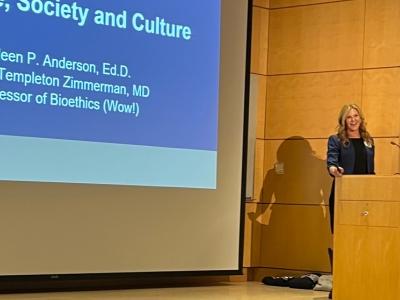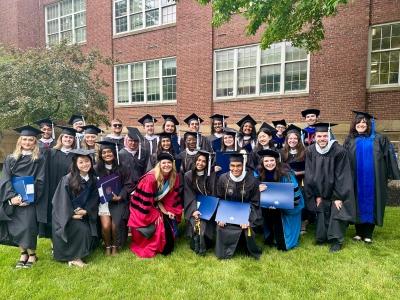Kids, courts and care: How CWRU professor Eileen Anderson protects vulnerable youth across Ohio
When Eileen Anderson, director of education for Case Western Reserve University’s bioethics and medical humanities programs, first encountered the court system during a divorce, she learned about the role of a guardian ad litem—an individual appointed to represent a child’s best interest in legal cases such as custody disputes, abuse or neglect proceedings, or foster care hearings.
What surprised her most was how little training was required of these professionals in fields such as child development, mental health, or education, despite the fact that their recommendations could carry life-altering consequences for children.
Determined to better understand the system, Anderson began studying how guardians ad litem (GALs) and court-appointed advocates (CASAs) operated across the United States. Through her research, she discovered just how vulnerable children are when entering the court system—whether through contested divorces, abuse and neglect, foster care, or juvenile justice—and how few legal professionals involved had the background needed to fully address those children’s needs.
Anderson later approached the Supreme Court of Ohio with a mission: to help strengthen legal education and training for guardians and related professionals by sharing her expertise in psychology, anthropology and neuroscience to build practical tools.

Anderson describes that in anthropology, place matters. For example, each state has different policies governing children’s best interests and the professionals who serve them. Even within Ohio, policies can vary across the 88 counties, and sometimes courtroom by courtroom. “I needed to get a handle on Ohio before I could move to other states. Now, I’m beginning to work with other states and national organizations to take some of the innovations developed in Ohio and adapt them for other contexts,” she explained. “Other states also have some great practices that we can learn more from.”
For the past five years she has collaborated with the Judicial College of the Supreme Court, guardians and CASAs in Cuyahoga County and beyond, helping to develop resources now being used across the country.
“In my own situation, what I could do to influence my children’s interaction with the court was limited,” said Anderson, who primarily assists youth, ages 10 to 18. “But being able to intervene now by creating tools, supports and interventions to make it better for other children is one of the most personally meaningful things I have ever done.”
Earlier in her professional journey, Anderson worked with abused and neglected girls in Belize, helping to influence both local and national policies. Today, her work has come full circle with efforts that have ranged from statewide training on cultural models and child development to co-creating a communications hierarchy of needs checklist for court professionals.
Anderson also gave a recent plenary address to the Ohio Association of Magistrates on cultural humility, which sparked invitations for future training in numerous counties throughout the nation.
At CWRU, Anderson thrives on the interdisciplinary opportunities that strengthen her work by mentoring undergraduate, masters’ and PhD students, along with MD, JD and postdoctoral trainees. She also enrolled in her first family law class at the School of Law last year to better understand the legal frameworks she encounters.
“I think having the breadth and depth of what being a CWRU faculty member allows is unparalleled,” she said. “One of the most wonderful parts of being here is working with our students across disciplines.”
Her newest project, a podcast titled Kids’ Health and the Courts to be launched in early 2026, draws directly on her collaborations across CWRU, where she aims to deliver short, accessible episodes paired with one-page summaries of essential points that address various topics—such as trauma and cognitive development, legal processes and community resources.
Produced with the help of CWRU students, these episodes will feature various faculty members across the university—from the School of Medicine and Frances Payne Bolton School of Nursing to the Jack, Joseph and Morton Mandel School of Applied Social Sciences, College of Arts and Sciences and other schools on campus.

“I realized we could have this amazing pool of guests who were experts in all of these conditions, policies or questions, and bring them on the podcast to talk about a discrete topic for 15 minutes or less,” Anderson explained. “We are trying to make these resources available to the people who need them in a very accessible, very digestible, quick and free way.”
Through all of her work, Anderson’s focus remains on reducing the suffering of vulnerable children in complex legal systems. Her greatest hope is to keep connecting professionals across disciplines, sharing resources and building a stronger foundation for children’s wellbeing in Ohio and beyond.
“They are suffering, and I think there’s a lot we can do to reduce that suffering and give them pathways for more positive outcomes,” she said.




